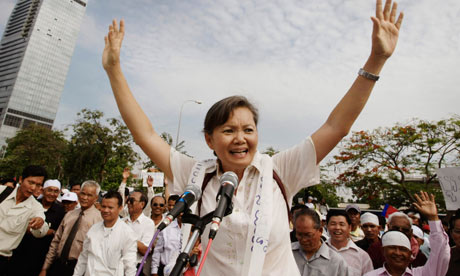Outspoken female MP takes battle to Hun Sen's ruling party as Cambodia goes to the polls

Cambodia's opposition MP Mu Sochua speaks during a rally in Phnom Penh, Cambodia Photograph: Heng Sinith/AP
She is brave, eloquent and defiant in a country where government
critics have been detained, imprisoned and sometimes killed for
speaking out. Now Mu Sochua, Cambodia's leading female opposition MP, is once again calling for change as she campaigns ahead of national elections on Sunday.
Her calls are falling on highly receptive ears: the opposition party was given a boost by the recent return from self-exile of its French-educated firebrand leader, Sam Rainsy.
With
their leader back, the Cambodia National Rescue party has a renewed
fervour, promising free healthcare, education and pensioner rights; an
increase in factory and civil servant wages; an end to illegal land grabs and forced evictions;
and lowered prices for rice, electricity and petrol – incentives that
have the potential to sway a huge chunk of the 9 million voters.
No
one expects the CNRP to win outright: Prime Minister Hun Sen's
Cambodian People's party (CPP) holds 90 of the 123 National Assembly
seats and won the past two elections by landslides despite claims of
fraud and irregularities – but it may make its greatest strides yet.
Their
weapon, says Sochua, is Cambodia's youth: a growing media-savvy
population who depend on each other and the internet to share news and
information that is recognisably absent from state-run TV and radio.
Supporters now openly wear CNRP stickers and T-shirts, and use Facebook
to discuss politics and hold meetings with one another, she added. But
such openness has also had its drawbacks.
"There is a noticeable
element of political discrimination against opposition supporters, who
are targeted by village chiefs," Sochua told the Guardian by phone as
she campaigned in Cambodia's second-largest city, Battambang.
"The
youth, when politically active, show it ... So the chief – who is the
eye and ear of the ruling party – gives their names [to the government]
and their names are deleted [from the voter list]."
The CNRP
claims that 1 million eligible voters have found their names deleted in
the lead up to the election, from opposition supporters to migrant
workers and anyone in between.
There are fears of vote-rigging,
too. A recent analysis of the National Election Commission list shows a
number of irregularities, among them duplicates of 25,000 names in Phnom Penh alone.
Despite Rainsy's triumphant return
last Friday – made possible by a pardon from Cambodia's king for
convictions that would have seen him jailed for 11 years – he has since
been barred from running by the NEC.
Rainsy has appealed against
the decision and is still hopeful it could be overturned in time,
although the NEC is believed by critics to be in favour of the People's
party.
"This is not an election contest if there is only one boxer
in the ring," Rainsy said. "Mr Hun Sen's victory under such
circumstances would look ridiculous and lead to trouble."
But
Rainsy stressed that it was unlikely Hun Sen – who has ruled for the
past 14 years – would allow him to stand, a move that could lead to
trouble.
"Because there will be no free and fair election, and
there is no democratic or peaceful way to channel the popular
discontent, when people – especially the youth – realise their votes
have been stolen, there could be an explosion of anger and protests," he
said, warning that "anything is possible".
Rainsy is not the only
one to warn of potential violence during this election. Hun Sen has
also spent the past few months cautioning Cambodians that a vote against the CPP could lead to war, or even the return of the Khmer Rouge.
Analysts
have warned that racialised rhetoric – particularly anti-Vietnamese
statements made by the opposition – could also cause trouble if not
checked.
Campaigners, including US politicians, have called for
America to cut its $73m aid to Cambodia if Hun Sen wins yet another
term, a move the opposition supports.
"This is not about the mercy
of aid, this is about the quality of aid, because what is at stake is a
whole nation, the lives of so many millions of people," says Sochua.
"If you continue to back a leader who does not put human rights and
democracy on his agenda, at the end of the day, what is at stake?
Democracy is at stake."
Sochua, who has invited comparisons to
Burma's Aung San Suu Kyi for her bravery and outspokenness, this week
won a complaint against a People's party commune chief and has faced a
defamation suit from Hun Sen himself – proof, she says, of her quest to
see a different Cambodia.
"The ruling party knows that I will
fight any threat, and I have done it again and again," she says with a
dismissive laugh. "The message is, 'Don't touch me – if you touch me,
you'll be done.' That doesn't mean I'm off the list of those who want to
target me, but I don't choose to live in fear – fear won't change
anything."

No comments:
Post a Comment